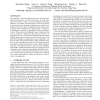Free Online Productivity Tools
i2Speak
i2Symbol
i2OCR
iTex2Img
iWeb2Print
iWeb2Shot
i2Type
iPdf2Split
iPdf2Merge
i2Bopomofo
i2Arabic
i2Style
i2Image
i2PDF
iLatex2Rtf
Sci2ools
PVLDB
2010
2010
Explore or Exploit? Effective Strategies for Disambiguating Large Databases
Data ambiguity is inherent in applications such as data integration, location-based services, and sensor monitoring. In many situations, it is possible to “clean”, or remove, ambiguities from these databases. For example, the GPS location of a user is inexact due to measurement errors, but context information (e.g., what a user is doing) can be used to reduce the imprecision of the location value. In order to obtain a database with a higher quality, we study how to disambiguate a database by appropriately selecting candidates to clean. This problem is challenging because cleaning involves a cost, is limited by a budget, may fail, and may not remove all ambiguities. Moreover, the statistical information about how likely database objects can be cleaned may not be precisely known. We tackle these challenges by proposing two types of algorithms. The first type makes use of greedy heuristics to make sensible decisions; however, these algorithms do not make use of cleaning information ...
| Added | 30 Jan 2011 |
| Updated | 30 Jan 2011 |
| Type | Journal |
| Year | 2010 |
| Where | PVLDB |
| Authors | Reynold Cheng, Eric Lo, Xuan Yang, Ming-Hay Luk, Xiang Li, Xike Xie |
Comments (0)

